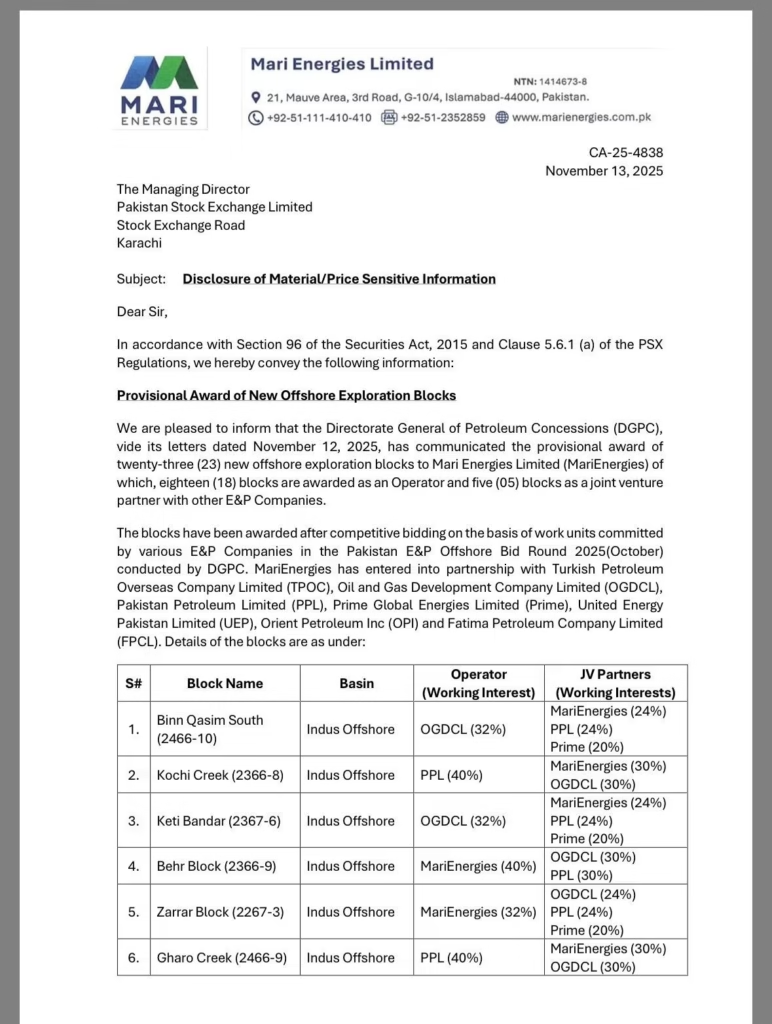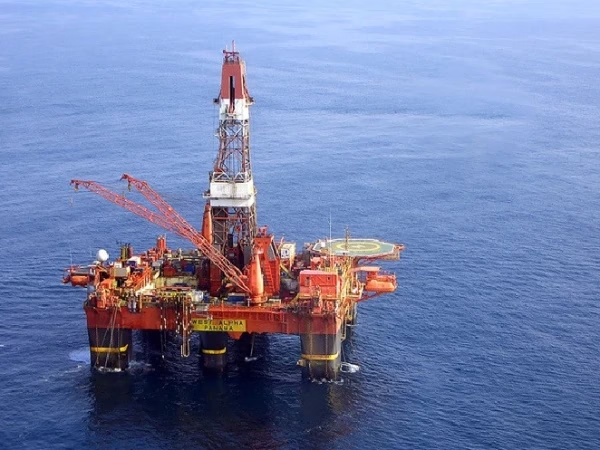The exploration of offshore oil and gas reserves in Pakistan has taken a major step forward as the Directorate General of Petroleum Concessions (DGPC) officially approved the exploration of 23 new offshore blocks. This development marks a significant milestone in Pakistan’s ongoing efforts to boost its domestic energy resources, reduce import dependence, and strengthen its economic stability through indigenous production.
A Landmark Decision for Pakistan’s Energy Sector
According to a letter shared by Mari Energies with the Pakistan Stock Exchange (PSX), the company announced that it has acquired 18 offshore exploration blocks as an operator and 5 additional blocks in partnership under the Pakistan E&P Offshore Bid Round. The large-scale allocation of these exploration zones demonstrates the government’s commitment to revitalizing offshore energy exploration and attracting both local and international investment into the country’s energy infrastructure.
The offshore oil and gas reserves in Pakistan are primarily located in the Makran and Indus Basins, two regions known for their geological potential and strategic significance. Exploration in these areas could help uncover substantial untapped resources, which may play a crucial role in stabilizing Pakistan’s long-term energy supply.
Local and International Collaboration
The letter from Mari Energies highlighted that extensive collaborations have been established with both local and foreign energy companies to pursue offshore exploration. Key partners include Pakistan Petroleum Limited (PPL), Oil and Gas Development Company Limited (OGDCL), and Turkish Petroleum Overseas Company (TPOC).

These partnerships are expected to enhance operational capacity, bring in advanced technologies, and introduce global best practices in offshore exploration. In addition, the project also involves collaboration with Prime Global Energies, Orient Petroleum, Fatima Petroleum, and United Energy Pakistan, all of which bring valuable technical expertise and investment capabilities.
This multi-stakeholder approach underscores Pakistan’s intent to develop offshore oil and gas reserves through a combination of domestic skill and international experience. The involvement of multiple operators also diversifies the risk and ensures a higher probability of discovery and success.
Government Support and Licensing Framework
The Government of Pakistan has played an active role in facilitating this expansion of offshore exploration. Through the Directorate General of Petroleum Concessions, the government has issued petroleum exploration licenses, production sharing agreements (PSAs), and joint operating agreements (JOAs) with the participating companies.
These agreements establish a clear operational framework, ensuring transparency, accountability, and equitable profit-sharing among all stakeholders. The structured licensing system also promotes investor confidence, a vital factor in attracting international energy companies to Pakistan’s offshore market.
Strategic Importance of Offshore Exploration
The approval of 23 new offshore oil and gas reserves in Pakistan is not just a business development — it’s a strategic economic move. Pakistan’s growing population and expanding industrial base have led to a rising demand for energy, while the country continues to rely heavily on imported fuel and liquefied natural gas (LNG).
Offshore exploration could significantly reduce the import bill, improve energy security, and stabilize the foreign exchange reserves. Furthermore, successful discoveries would support the government’s long-term goal of achieving self-reliance in the energy sector.
The Makran Basin, in particular, is viewed as one of the most promising offshore regions, with deep-sea geological structures that could potentially hold large hydrocarbon deposits. Similarly, the Indus Basin has already demonstrated proven reserves in onshore areas, suggesting that its offshore extension could yield substantial discoveries as well.
Boosting Investor Confidence in Pakistan’s Energy Market
The new exploration drive comes at a time when Pakistan is seeking to revive foreign investor confidence across multiple sectors. Energy exploration, especially offshore, is seen as a high-potential area for long-term returns. The transparent bidding process under the E&P Offshore Bid Round has been widely praised by industry experts for its professionalism and openness.
Moreover, the involvement of reputed organizations like Turkish Petroleum Overseas Company and United Energy Pakistan signals renewed international interest in Pakistan’s resource potential. With global energy prices fluctuating, investors view Pakistan’s offshore sector as a promising opportunity for diversification and regional influence.
Economic and Environmental Considerations
While the exploration of offshore oil and gas reserves in Pakistan offers immense economic promise, it also brings with it the responsibility of ensuring environmental protection and sustainable development. Offshore drilling involves complex ecological challenges, particularly in fragile marine environments like the Makran coast.
The government and participating companies are expected to implement strict environmental safeguards, conduct detailed impact assessments, and follow global best practices for sustainable offshore operations. This balanced approach will help ensure that exploration activities benefit the economy without compromising marine ecosystems.
A Step Toward Energy Independence
With the DGPC’s approval of 23 offshore oil and gas reserves, Pakistan has taken a decisive step toward redefining its energy future. The collaboration between Mari Energies, PPL, OGDCL, and international partners reflects a unified vision — one that combines innovation, investment, and sustainability to unlock the country’s vast offshore potential.
If these exploration efforts yield positive results, they could transform Pakistan into a more energy-secure and economically resilient nation. The government’s proactive stance and industry cooperation indicate that Pakistan is finally moving toward a new era of energy independence powered by offshore oil and gas reserves.
In conclusion, this historic development is not just about discovering new resources beneath the sea — it’s about building a sustainable energy future for Pakistan through strategic planning, international collaboration, and responsible exploration.



